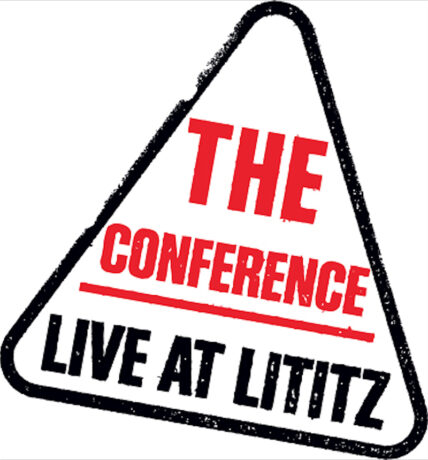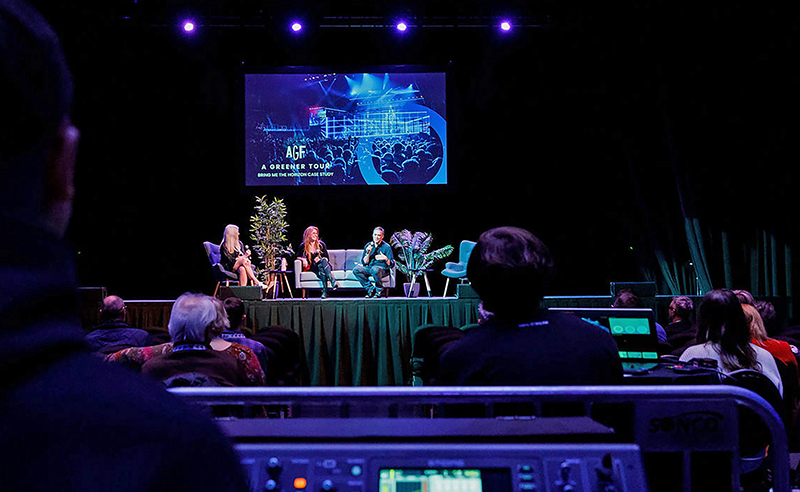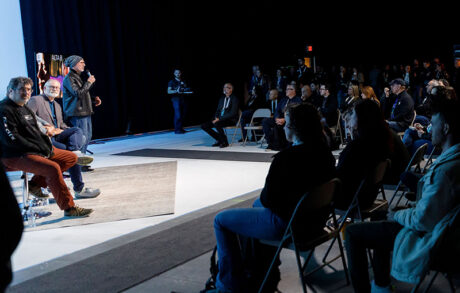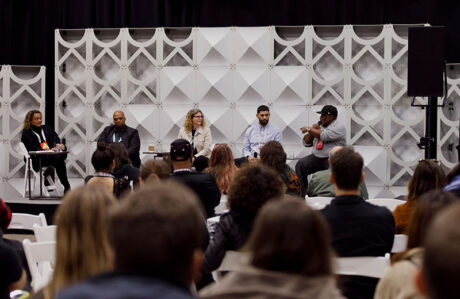
After the successful launch in 2022, THE Conference: Live at Lititz returns December 6-8, 2023. In partnership with the Rock Lititz Community, led by President/CEO of Rock Lititz, Andrea Shirk, along with the founders of THE Conference—industry veterans Charlie Hernandez, Jake Berry, Marty Hom, and Stuart Ross (CJMS)—will continue the work of collaboration, growth, and mentorship at the second annual conference. The theme of last year’s conference was “leaving it better than we found it”, a phrase that the CJMS team uses often. Hernandez, Hom, Ross, and Shirk recently spoke with PLSN about what they took away from last year’s conference, what’s coming next, the focus of THE Conference 2023, and what they would like to build on this year.
“Leaving it better than we found it. That’s still the underlying premise of everything that we do, in every way that we do it, and every show that we do,” comments Hernandez. “I find these conferences to be concept albums. So, our concept album for this year is where we were—how did it begin, where we’re at right now, this post-Covid extravaganza that’s happened this past year, and where we’re heading next. We’re exploring the beginnings, how we got to the place that we’re at right now, and what are we going to do to make it better, and leave it better, as we move forward.”
For Ross, it’s a combination of camaraderie and actionable problem solving. “What’s important to our industry? What are the issues? This is not us dictating what the issues are, but listening to what the issues are. And as a group of 800, we are going to come up with actionable problem-solving. It may be career problem-solving, and it may be industry problem-solving, but we want people to walk out saying, ‘Not only did I make new connections and new longtime friends, but I figured out a way to make our industry a better place.’
Shirk notes they want to build upon the work they’ve been doing at Rock Lititz for the wider industry. “We are excited to take some of the work we’ve been doing at Rock Lititz for our community of folks who are here and think about how we could get broader industry engagement. Really looking at how do we celebrate who we are, how do we celebrate the success of this industry, but also really looking forward to how do we evolve and grow to meet the changing needs of the industry. So, whether that’s really helping the next generation of the workforce find their way, or helping to improve some of the challenges we face as an industry, we just love the idea of being part of the conversation. We believe deeply in collaboration and that multiple perspectives lead to the best outcome. That really engaging the industry to feel like we’re all part of this journey together is important to us.”

Hom wants to keep building upon what the team did last year and talks about how he changed his thinking on a topic when he applied lessons from last year’s conference. “I think for all of us that we just want it to be better, and to again provide the great content of issues that we’re still addressing in the touring industry. You know, I was a bit skeptical on the mental health aspect, but I ended up using things I learned at last year’s conference on the Beyonce tour, and I have to tell you, it was so beneficial. For me, I’m not a skeptic anymore. I think it’s something that the industry needs. I had a great response to that effort and think it should be something that’s provided on every tour.”
When asked what was something that came out of last year’s conference that really made an impression, Shirk recalls one that really stuck with her. “Fairly late into one of the evenings when I thought everyone was in complete ‘social mode’,” comments Shirk, “I got a phone call asking, ‘Hey, could we open a conference room? It’s for a tour manager meetup, that just naturally came together and suddenly there’s a group of 30 of us.’ What I loved was they didn’t want to drink beers; they wanted to keep talking about what challenges do tour managers face, how do we help new folks? So, a large group of us went over to the studio. There were probably 40 different folks from interns to Marty Hom, one of the most experienced tour managers in the industry. They were exchanging tools, best practices, experiences. They all exchanged email addresses. Some of the experienced tour managers were like, ‘Sure, I’ll share my tour spreadsheets, and all my tips and tools with some of the new folks.’ I think that both reflected the relationship part of what makes this industry so special, but also the collective aspect that we’re all in this together. It wasn’t, ‘That’s my tool. I can’t share that.’ It was, ‘This is our tool and if you, by the way, have any feedback to make it better, let us know.’ So, I did love that very organic community that developed during the conference.”
That impromptu meetup has inspired others to keep it going, well after the conference. Shirk knows of “a Nashville group that met at the conference and still meets to this day on a recurring basis. Again, they just got together and were like, ‘Hey, we all live in the same community. We probably work with a lot of the same clients. How can we just meet to continue the discussion about what we are seeing and how can we support each other?’”

In the live entertainment industry, people get so busy, and their schedules are so fractured, that they don’t have the opportunity to come together. To meet up and discuss issues that need to be addressed; issues that affect their lives. “What’s funny about our world, is that we can go months, even years, without seeing someone and literally pick up the conversation where we were two years ago,” comments Hernandez. “That was the great thing with having everyone come together at the end of last year, everyone was so far apart for basically three years leading into this. The reconnection was extraordinary. For me, the proof of what our connections are with each other—from years and years of mutual respect and the work we all do together—really showed in the scholarship fund that we did for Just A Bunch of Roadies and the John Campion and Lori Tierney scholarships where everyone came together. We were able in the end to help put six kids through college. All that is based on those real relationship and everyone coming together. That for me was one of the greatest things that has carried on throughout the year, the philanthropy, the people, the generosity, and how we’re all in it together.”
Touching on the tour manager meetup sited by Shirk, Ross feels that the industry veterans who are behind THE Conference learned valuable lessons from some of the youngest members of the industry. “All of us tried to create a conference that would be meaningful to the attendees,” states Ross. “After the tour manager meetup, I found that it was just as meaningful to the organizers. That we had the opportunity to have people new to the industry teach us. It was an astonishing meeting. All the tour managers in that room were all willing to discuss how we do things, but we instead discussed why we did things. We went to the bigger picture, and everybody shared about how they thought, how they handled their craft. It was just great.”
Building on the connections made at THE Conference in 2022, Ross points out that there’s a tour manager thread on WhatsApp. “Anybody can ask anything,” Ross says. “’Hey, do you guys know a great hotel in Charleston, SC?’ to, ‘Hey, I’m really stuck on a settlement problem. Can anybody help me out?’ Everybody jumps in. These are people that most of us didn’t know before the conference; half the room didn’t know the other half of the room. Now everyone knows everybody. Another great moment was early in the conference, a guy I know who runs a large events production company came up to me, and said, ‘I just got some knowledge that would’ve saved me $500 grand on staffing last year.’ Now, I don’t know exactly what that point was that he heard, but it resonated. And this is a very experienced guy, so I’m really proud of us.”

THE Conference also led to employment for some of the attendees, according to Shirk. “I think it’s important to note too, that after that tour manager meetup, I know at least three young people of color who were offered positions by someone they met in that room within a few months of the conference. Not only do we want to learn, but we want to get people jobs. And I think that’s really incredible. They said they were offered jobs by people that they had never met before and only met at the conference. So, I think that’s also really important, and critical, that we’re connecting the dots for folks to not just learn, but to also then go get work, to go practice those skills.”
The CJMS team hopes that this year’s attendees might come in prepared with questions; issues they’d like to discuss; and goals for what they want to take away from the conference. “I would love to see the attendees bring in their own issues, their own questions, and not be afraid to ask,” states Ross. “We are not the type of conference that puts five experts in front of a room full of people and says, ‘The people up on that stage know more than you do.’ That isn’t us. We put five people on the stage and say, ‘These people are going to open a group discussion and as an industry, we’re going to solve it together. We’re facilitators, we’re not lecturers. So, come in with your own issues. Bring them up. We want to hear you, we’re in this together.’”
“I think to Stuart’s point,” adds Hernandez, “and this is something that I’ve been thinking about since that first panel, I think what’s important is to stress that the people sitting in the audience are just as important. Their voices are just as important as the people sitting up there on stage. Just because, like Stuart said, we selected four or five people to sit on stage. It’s the attendee’s conference, so they need the ability to speak up, and everybody else listens. Just because you’re not sitting on that stage, you are still a participant, and your voice needs to be heard. We want to give everybody attending the space to participate.”
For Shirk, the phrase that comes to mind is a “willingness to be vulnerable. That goes both ways, a willingness to be vulnerable, to back up what Stuart is saying, ‘I am willing to come here and share because the reality is that’s when we learn most. I always joke ‘we learn most from our screw-ups.’ And while I’ve done my fair share and learned my lessons, if I can learn from yours and avoid having to do them myself, isn’t that real success? So, I think a willingness to be vulnerable, to learn, to grow, and to share, ‘Here’s what I’ve done wrong and here’s how I learned from that.’ I think we can all collectively grow from that.”
Hom points out that when CJMS were planning the first conference, he talked to Stuart, Charlie, and Jake, saying “’ Nobody wants to hear us old guys talk anymore. We’ve been on enough panels.’ I think one of our goals was to bring in new voices, young voices, and diverse voices. I think we were very successful in that last year, and we want to continue to do that this year as well. Let people get up on that stage who don’t normally have a chair on that stage, that way people can hear different people. speak and share ideas.”
Shirk point out, “We have talked about who is on the stage, and I agree with Marty’s point, but also the reality is a lot of our programming is actually intending to remove the stage and instead create, to Stuart’s point, environments in which we are discussing and talking amongst the crowd. We sometimes get caught up and say, ‘What panels are we going to have?’ But I think all of us have been leaning towards thinking about it less as panels and more as interactive dialogue, engaging discussions, and creative methodologies of how we bring content to folks. I think that people reacted well to that last year because they liked not just sitting in a room and listening but being part of the discussion.”
THE Conference: Live at Lititz will be back December 6-8, 2023. For further information go to: www.theconferenceliveatlititz.com.


